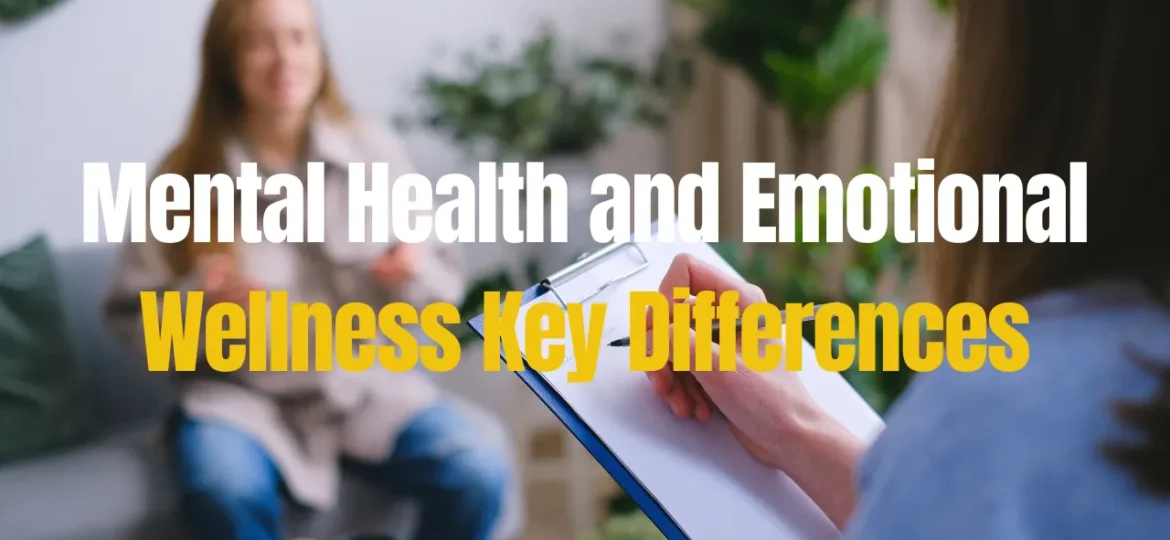
The terms “mental health” and “emotional wellness” come up often. More people are seeking support for their psychological and emotional needs. Despite their frequent pairing, these concepts cover different areas of our health. Mental health looks at our thoughts, feelings, and behaviors in a wider context. Emotional wellness focuses on how we handle and express our emotions each day. Knowing the differences between these two areas is key. It also helps to understand the value of therapy and wellness counseling. This knowledge can guide us in nurturing both our mental and emotional health for a more balanced life.
This article will explore the main differences between mental health and emotional wellness. We will discuss their impact on our lives and the role of therapy in supporting both. Additionally, we will examine the importance of wellness counseling, especially in places like Dartmouth. This will show how a holistic approach can benefit both mental and emotional health.
Mental Health vs Emotional Health
Understanding the difference between mental health and emotional wellness is the first step in improving overall well-being. Let’s examine both concepts in greater detail:
Mental Health
Mental health refers to our overall psychological state, including thoughts, emotions, and behaviors. It affects how we think, feel, and act. It plays a key role in coping with stress, making decisions, and relating to others. Mental health can influence many areas of life, from relationships to work performance.
Mental health issues can take many forms, such as anxiety, depression, bipolar disorder, and schizophrenia. Healthcare professionals usually diagnose these conditions. Long-term management may involve therapy and medication. Mental health isn’t just the absence of illness. It also includes having a stable mental state, building resilience, and using healthy coping strategies when facing life’s challenges.
Emotional Wellness
Emotional wellness focuses on how we manage and express our emotions. Emotional wellness focuses on finding balance in our emotions. This balance helps us handle life’s challenges better. It is different from mental health, which is about psychological conditions. Here are some key aspects of emotional wellness:
- Self-awareness: Understanding and recognizing your own emotions is crucial for emotional wellness. By being aware of your feelings, you can begin to process and express them in healthy ways.
- Emotional resilience: Emotional wellness involves the ability to bounce back from emotional setbacks. Resilience helps you cope with difficult situations, manage stress, and recover from negative experiences.
- Healthy emotional expression: Managing and expressing emotions appropriately is key to emotional wellness. This includes expressing feelings constructively, without bottling them up or reacting impulsively.
- Building positive relationships: Emotional wellness supports the development of healthier relationships with others. When you manage your emotions well, you are better able to communicate, collaborate, and empathize with those around you.
Emotional wellness allows you to navigate life’s ups and downs with confidence, fostering personal growth and stronger relationships.
Mental Health vs Emotional Health
While mental health and emotional wellness are distinct, they are deeply interconnected. Mental health issues, if left untreated, can affect emotional wellness. For example, someone suffering from depression may experience a range of negative emotions that are difficult to manage. Similarly, chronic emotional distress can lead to the development of mental health problems, such as anxiety or depression.
The key difference between the two lies in the scope of treatment. Mental health treatment is typically focused on managing and alleviating mental health conditions through therapy, medications, and other interventions. Emotional wellness can improve with lifestyle changes, coping strategies, and expressing feelings. You don’t always need clinical treatment for this.
The Role of Therapy in Mental Health and Emotional Wellness
Therapy plays an important role in both mental health and emotional wellness, but the approach varies depending on the needs of the individual.
Therapy for Mental Health
For people facing mental health challenges, therapy is key to managing symptoms and enhancing life quality. It helps individuals understand their conditions, spot negative thought patterns, and create coping strategies.
Cognitive-behavioral therapy (CBT) is a common and effective treatment for many mental health issues like anxiety, depression, and PTSD. CBT helps individuals identify and change negative thoughts, beliefs, and behaviors that cause emotional distress. It encourages them to replace unhealthy thoughts with more positive ones.
Other therapies, such as dialectical behavior therapy (DBT), psychodynamic therapy, and interpersonal therapy (IPT), also help improve mental health. These approaches assist individuals in managing relationships, building emotional regulation skills, and addressing unresolved trauma.
Emotional Wellness Therapy
Emotional wellness therapy helps people build emotional resilience and self-awareness. It also teaches skills to manage emotions. Unlike mental health therapy, which treats specific conditions, emotional wellness therapy is for anyone wanting to improve their emotional health. This is true even if they do not have a diagnosed mental health issue.
Therapists who specialize in emotional wellness use techniques like mindfulness and stress management. They help individuals process emotions in healthy ways. These therapies may address relationship dynamics, break negative emotional patterns, or foster a positive outlook on life.
Mental Clarity Therapy
Mental clarity therapy is another valuable tool for improving both mental and emotional wellness. This therapy helps individuals who are feeling mentally overwhelmed, distracted, or unfocused to clear mental clutter and regain clarity. Mental clarity therapy encourages individuals to engage in techniques that enhance concentration, decision-making, and emotional regulation, ultimately promoting cognitive and emotional well-being.
Mental clarity therapy can be particularly helpful for individuals dealing with stress, anxiety, or cognitive overload. By addressing issues such as mental fog and excessive worry, individuals can regain the mental sharpness needed to navigate life’s challenges with confidence and clarity.
A Holistic Approach to Mental and Emotional Health
Wellness counseling takes a holistic view of mental and emotional health. It combines different therapeutic practices and lifestyle strategies. The focus is on the mind, body, and spirit to create balance and improve well-being.
In Dartmouth, many wellness counseling services are available. Individuals can work with counselors who specialize in mental and emotional wellness. These services include mindfulness, stress reduction, physical activity, and nutritional guidance. The goal is to help people manage emotional distress and mental health issues while leading balanced, fulfilling lives.
Wellness counselors connect physical well-being to counseling. They help clients see how emotional and mental health relate to physical health. This holistic view encourages healthier lifestyle choices, self-care, and mindfulness practices.
Emotional Wellness Therapy
Emotional wellness therapy is more than just a means of solving emotional problems. It’s about creating a life where emotions are processed and expressed in a healthy way. By working with a therapist, individuals can develop healthier emotional habits, increase self-awareness, and build emotional resilience. The goal is not only to address specific emotional challenges but to empower individuals to manage their emotions in a way that fosters long-term well-being.
Therapists often use a variety of techniques, such as cognitive-behavioral strategies, mindfulness practices, and emotional intelligence exercises, to guide individuals through the process of emotional healing and clarity. These techniques provide individuals with practical tools for emotional regulation and help them build resilience to handle the challenges that life inevitably presents.
Mental Clarity Therapy
- Mental clarity therapy is a valuable tool for those who feel mentally scattered or overwhelmed. This therapy helps individuals focus their thoughts, clear mental clutter, and regain emotional and cognitive balance. In addition to its benefits for mental health, mental clarity therapy enhances emotional wellness by fostering clearer thinking and improved emotional processing.
- Mental clarity therapy helps people calm their minds and focus better. It restores balance in thinking and emotions. With this therapy, individuals can face challenges more clearly. This leads to better decisions and less emotional stress.
Wellness Counseling
Wellness counseling is a comprehensive approach that helps individuals address both emotional and mental health concerns. By promoting self-care practices, emotional regulation, and mental clarity, wellness counseling empowers individuals to achieve greater overall well-being. In Dartmouth, wellness counseling services are available to help individuals develop healthier emotional and mental habits while addressing stress, anxiety, and other emotional challenges.
This holistic approach encourages individuals to focus on the interconnectedness of their mental, emotional, and physical health. By embracing wellness counseling, individuals can create a more balanced life that supports long-term emotional and mental stability.
Conclusion
Understanding the difference between mental health and emotional wellness is crucial for achieving a balanced, healthy life. While mental health refers to the broader aspects of our psychological functioning, emotional wellness focuses on how we manage and express our emotions. Both are essential for overall well-being and often intersect in ways that can impact one another.
Therapy plays a pivotal role in supporting both mental health and emotional wellness. Whether through clinical treatments for mental health conditions or therapeutic techniques for emotional balance, therapy can help individuals improve their quality of life and manage their emotions. In Dartmouth, wellness counseling services offer a holistic approach to both mental and emotional health, promoting long-term well-being and helping individuals lead more fulfilling, balanced lives.
By understanding the key differences and connections between mental health and emotional wellness, individuals can take proactive steps to care for both their minds and emotions, leading to a healthier, more resilient life. If you are seeking support in improving your emotional well-being or mental health, consider reaching out to a professional therapist or wellness counselor who can guide you on the path to healing and clarity.


